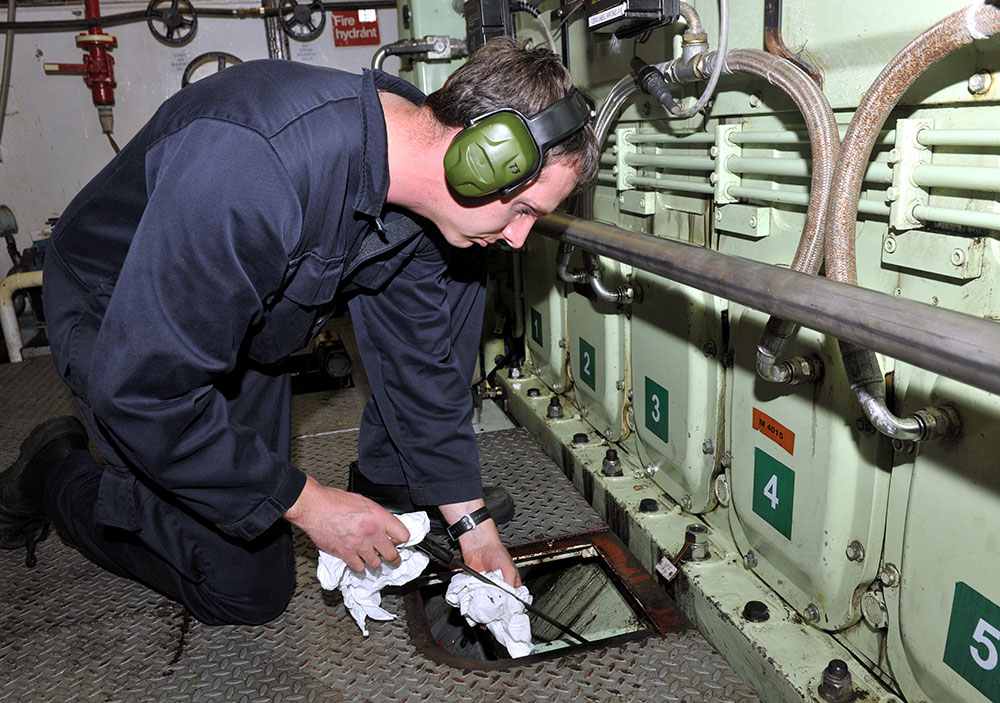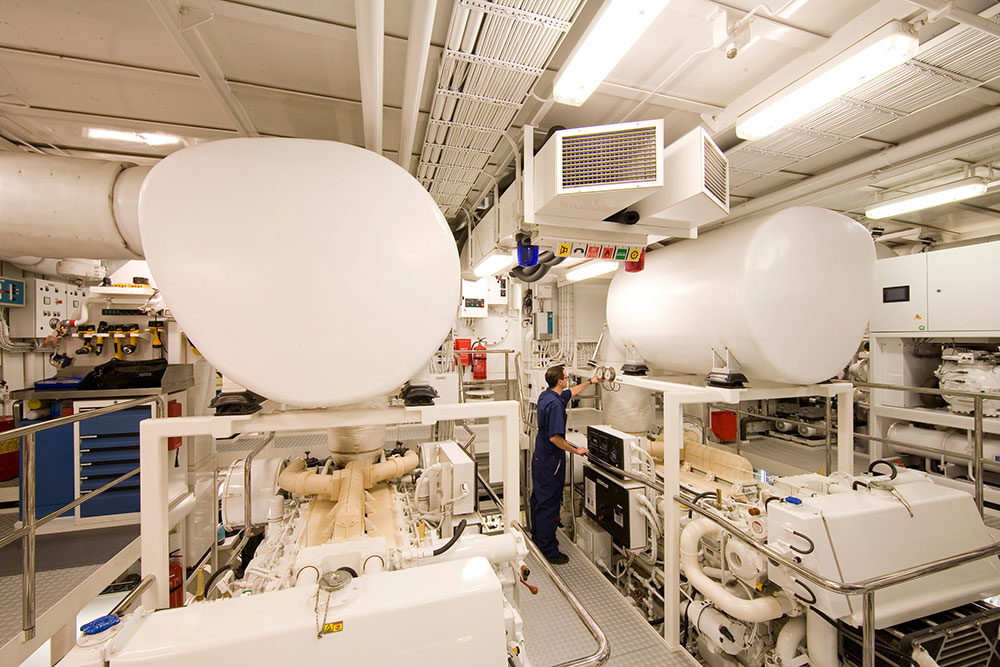Demand is rapidly outstripping the availability of qualified engineers to manage the maintenance of modern vessels, which are powered by an increasingly sophisticated range of electrical, electronic and engineering equipment.
The engineering department is responsible for the safety, performance and efficiency of the vessel’s machinery. It is their job to maintain the mechanical and electrical operations, ensure robust maintenance schedules are implemented and troubleshoot problems efficiently.
Well-paid jobs for people with the right qualifications and capabilities are available now.
Skills and attributes
A ship's engineer should be technically adept and versatile with the ability to take on a variety of different roles, from the engine room to hotel services. They must also have a wide knowledge of vessel systems from the main engines to refrigeration units, generators and air conditioning units.
Engineer officers
Marine engineer officers are responsible for the maintenance and operation of the ship’s main propulsion machinery and auxiliary plant, including deck machinery, air conditioning plants, refrigeration plants and domestic and electrical services. Depending on the type of ship and operational circumstances, engineer officers will be required to keep watches in the ship’s engine room.
The chief engineer is in charge of the department and is responsible to the ship’s master for its efficient operation. While the law demands that only one person can be in overall command of the ship, and by tradition that person is the master, the chief engineer’s status and salary is very similar to that enjoyed by the master.
Marine electro-technical officers (METOs)
These specialist officers work within the engineering department where they take responsibility for the maintenance of on-board control engineering and electronic systems, including propulsion control, radio communications and electronic navigation aids.
METOs should have the opportunity to develop their careers along a professional electrical engineering path, perhaps leading to the rank of chief electro-technical officer, chief technical officer or electrical superintendent (company dependent).
Find out more about how to become a marine engineer or electro-technical officer at our open day.

Roles
Chief engineer
The chief engineer oversees the engineering department and is responsible to the master for its efficient operation. They have overall control and decision-making powers for the engineering department, and responsibility for ensuring all planned mechanical and electrical maintenance takes place. The chief engineer also co-ordinates operations with shoreside engineers.
Second engineer
The second engineer has engineering watchkeeping responsibilities and oversees the training of more junior engineers. They are directly responsible to the chief engineer and have responsibility for the management of the engine room and the engine room maintenance team.
Third engineer
The third engineer has engineering watchkeeping responsibilities and is responsible for the maintenance of certain engine room equipment (eg, auxiliary generators). They will also look after the electrics if there isn't an electrician or a marine electro-technical officer on board.
Junior engineer/fourth engineer
Used as a familiarisation role for newly-qualified officers in some companies, a junior/fourth engineer officer supports the third engineer officer and is responsible for the fuelling and maintenance of specific engine room equipment (eg, purifiers). Engineering watchkeeping responsibilities will be undertaken at times, alternatively undertaking general maintenance duties on a day work routine.
Engine rating
Engine ratings are support members of the engineering department who assist with maintenance of the engine room machinery plant. This is a hands-on role which includes mechanical maintenance, engineering operations and general duties.
Marine electro-technical officer (METO)
This is a specialist role supporting the electrical and electronic systems found on board modern merchant ships and superyachts, from bridge navigation equipment and engineering propulsion systems to communications and audio-visual kit, including the latest in entertainment play-out, IT systems and gadgets.
Our career progression charts are designed to give you a clear guide to the best route and courses required to further your career.
Career options
Merchant Navy
Engineer officers
Newly-qualified marine engineer officers will usually join their company’s fleet as a fourth engineer officer, undertaking engine room watchkeeping duties and having responsibility for the safe and efficient operation of the ship's main propulsion unit and other vital services.
As their skills and experience develop, young officers progress to the higher certificates of competency, leading eventually to the chief engineer’s certificate and possibly to the position of chief engineer officer.
Marine engineer officers acquire a range of transferable skills through professional development and experience, which have many applications in jobs ashore, both related and unrelated to the marine industries. Shipping companies often recruit their shore-based engineering superintendents from seagoing staff, and classification societies and marine insurance companies recruit machinery surveyors from the same source. The MCA also requires surveyors and examiners, while maritime colleges recruit lecturers and assessors.
Marine electro-technical officers (METOs)
Newly qualified marine electro-technical officers (METOs) will normally work within the engineering department, assisting the marine engineer officers with their specialist knowledge of control engineering and electronic systems, including propulsion control, radio communications and electronic navigation aids. Fault diagnostics and repair of a range of electrical and electronic equipment is a prime responsibility.
METOs should have the opportunity to develop their careers along a professional electrical engineering path, perhaps leading to the rank of chief electro-technical officer, chief technical officer or electrical superintendent (company dependent).
METOs also acquire a range of transferable skills through professional development and experience, which have many applications in jobs ashore, both related and unrelated to the marine industries.

Superyachts
The engineering department is responsible for the yacht’s safety, performance and efficiency. It is their job to maintain the mechanical and electrical operations of the yacht, ensure robust maintenance schedules are implemented and troubleshoot problems efficiently.
What is the small vessel engineering certification?
The MCA has brought into force a new alternative pathway to engineer qualifications which simplifies the number and levels of qualifications across the superyacht and other small commercial vessels sector.
The MCA has pulled together the pre-existing qualifications for engineer officers, leading to certificates of competency (CoC) restricted to yachts only, into a single generic qualification called Engineer Officer Small Vessel Certificate of Competency.
The small vessel (SV) certification is for engineer officers wanting to work on:
- commercial yachts,
- tugs,
- large workboats,
- fishing vessels,
- stand-by seismic survey vessels,
- oceanographic research vessels, or
- government patrol vessels.
What routes are available?
- Standard MCA approved programme
- Experienced seafarer route for experienced seafarers serving on small vessels
- Alternative route - for those with existing engineering qualifications such as graduate engineer / HND / HNC / apprentice.
Transferring from the Merchant Navy to superyachts
It is highly recommended that you do not leave the Merchant Navy until you have obtained your Class 2 CoC, as this will allow you to reassess your career choice at any point from a position of strength.
Many owners are beginning to recognise Merchant Navy officers have undergone a much more robust training regime than yacht engineers and are prepared to pay a premium for this. The large yachts, because of their tonnage and engine size, can only employ engineers with a full Merchant Navy CoC.
Finding a job on superyachts
Well-paid jobs for people with the right qualifications and capabilities are available now.
Most yacht crew agencies have websites, so check them out to see what kind of jobs and salaries are being offered.
You can register with many agencies in advance online, but you should still visit agencies in person when you can. Remember to make an appointment in advance. After you've made contact, check in with them regularly and keep them up to date with your progress. If you do find a job, inform the agencies so they can take you out of their active files.
We recommend you contact our specialist recruitment partners, Burgess and, Elite International for their advice and job opportunities.
Get yourself known and get some experience by taking day work or part-time work around the docks. Dock walking and handing out your CV at boat shows and large maritime events will help.
Day working is a good way to make some money in between jobs and get yourself known. The work usually involves cleaning, painting, sanding or varnishing. Day work means you'll hear about permanent jobs when they become available.
Connect with experienced crew members who are usually happy to give helpful advice. There are community forums you can join, such as Dockwalk and there are a number of yacht crew advice pages written by current crew members.
Offshore oil and gas
For Merchant Navy engineer or electro-technical officers, there are many opportunities that exist within the offshore oil and gas industry to make a transition into this sector. These can be with shipping companies that operate offshore support vessels within the industry sector or other companies that support the offshore industry in the area of marine related operations, such as mobile offshore drilling units.
The maritime engineering skills, STCW and academic qualifications, together with the general marine background of such personnel, often prove to be an attractive asset to offshore companies when filling positions.
Personnel with maritime engineering backgrounds can progress in rank or position as their experience within the industry develops, possibly with additional industry related qualifications, to positions of senior management in engineering/electrical related disciplines offshore.
Opportunities in the offshore industry for mariners have become very global and access to foreign areas of offshore activity has opened significantly. Working in these areas as far away as Australia on regular short periods and enjoying good terms and conditions of employment is not uncommon.
Renewables
The engineer officer/mechanic on board is responsible for the setup, safe running and maintenance of all electrical and mechanical, plant, propulsive, cargo, safety and domestic machinery/equipment.
The engineer is also responsible for working closely with the vessel’s master to ensure that all stores are requisitioned in a timely manner to ensure continued vessel operational capability.
For many vessels, the engineer/mechanic may also be required to assist on deck with mooring and transfer operations, hence this role may require multi-capability/department additional skills.
The route for qualification as transfer vessel mechanic is dependent upon any existing engineering knowledge or experience and the ultimate qualification sought. In general, operators require a minimum of an Approved Engine Course Certificate (AEC).
All positions (irrespective of area, kW or tonnage limitations) require successful completion of MCA-approved study routes and exams (where applicable), together with relevant sea experience.